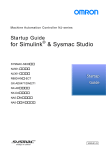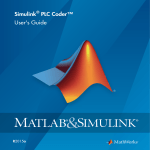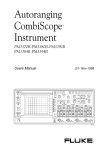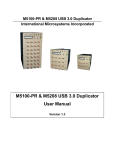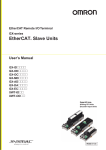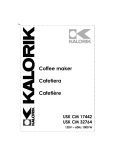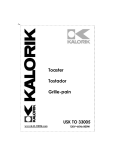Download MATLAB SIMULINK PLC CODER 1 Operating instructions
Transcript
Machine Automation Controller NJ-series Startup Guide for Simulink ® PLC Coder™ & Sysmac Studio SYSMAC-SE20□□ NJ501-□□□□ NJ301-□□□□ R88D-KN□-ECT GX-AD0471/DA0271 W529-E1-01 ©OMRON, 2013 All rights reserved. No part of this publication may be reproduced, stored in a retrieval system, or transmitted, in any form, or by any means, mechanical, electronic, photocopying, recording, or otherwise, without the prior written permission of OMRON. No patent liability is assumed with respect to the use of the information contained herein. Moreover, because OMRON is constantly striving to improve its high-quality products, the information contained in this manual is subject to change without notice. Every precaution has been taken in the preparation of this manual. Nevertheless, OMRON assumes no responsibility for errors or omissions. Neither is any liability assumed for damages resulting from the use of the information contained in this publication. Introduction The NJ-series Startup Guide for Simulink® PLC Coder™ and Sysmac Studio (hereinafter, may be referred to as “this Guide”) describes the startup procedures that are required to use a combination of Simulink® PLC Coder™ from The MathWorks® Inc. and NJ-series CPU Unit for the first time and the basic operating instructions for the Sysmac Studio. A simple single-axis positioning example is used for the discussion. You can perform the procedures that are presented in this Guide to quickly gain a basic understanding of the combination of Simulink® PLC Coder™ and NJ-series CPU Unit. This Guide does not contain safety information and other details that are required for actual use. Thoroughly read and understand the manuals for all of the devices that are used in this Guide to ensure that the system is used safely. Review the entire contents of these materials, including all safety precautions, precautions for safe use, and precautions for correct use. Intended Audience This guide is intended for the following personnel. • Personnel in charge of introducing FA systems • Personnel in charge of designing FA systems The personnel must also have the following knowledge. • Knowledge of electrical systems (an electrical engineer or the equivalent) • Knowledge of MATLAB®/Simulink® from The MathWorks® Inc. • Knowledge of NJ-series CPU Units • Knowledge of operation procedure of Sysmac Studio Applicable Products This guide covers the following products. • CPU Units of NJ-series Machine Automation Controllers • Sysmac Studio Automation Software • MATLAB®/Simulink® from The MathWorks® Inc. • Simulink® PLC Coder™ from The MathWorks® Inc. Special Information The icons that are used in this Guide are described below. Precautions for Correct Use Precautions on what to do and what not to do to ensure proper operation and performance. Additional Information Additional information to read as required. This information is provided to increase understanding or make operation easier. 1 Terms and Conditions Agreement Read and understand this catalog. Please read and understand this catalog before purchasing the products. Please consult your OMRON representative if you have any questions or comments. Warranties. (a) Exclusive Warranty. Omron’s exclusive warranty is that the Products will be free from defects in materials and workmanship for a period of twelve months from the date of sale by Omron (or such other period expressed in writing by Omron). Omron disclaims all other warranties, express or implied. (b) Limitations. OMRON MAKES NO WARRANTY OR REPRESENTATION, EXPRESS OR IMPLIED, ABOUT NON-INFRINGEMENT, MERCHANTABILITY OR FITNESS FOR A PARTICULAR PURPOSE OF THE PRODUCTS. BUYER ACKNOWLEDGES THAT IT ALONE HAS DETERMINED THAT THE PRODUCTS WILL SUITABLY MEET THE REQUIREMENTS OF THEIR INTENDED USE. Omron further disclaims all warranties and responsibility of any type for claims or expenses based on infringement by the Products or otherwise of any intellectual property right. (c) Buyer Remedy. Omron’s sole obligation hereunder shall be, at Omron’s election, to (i) replace (in the form originally shipped with Buyer responsible for labor charges for removal or replacement thereof) the non-complying Product, (ii) repair the non-complying Product, or (iii) repay or credit Buyer an amount equal to the purchase price of the non-complying Product; provided that in no event shall Omron be responsible for warranty, repair, indemnity or any other claims or expenses regarding the Products unless Omron’s analysis confirms that the Products were properly handled, stored, installed and maintained and not subject to contamination, abuse, misuse or inappropriate modification. Return of any Products by Buyer must be approved in writing by Omron before shipment. Omron Companies shall not be liable for the suitability or unsuitability or the results from the use of Products in combination with any electrical or electronic components, circuits, system assemblies or any other materials or substances or environments. Any advice, recommendations or information given orally or in writing, are not to be construed as an amendment or addition to the above warranty. See http://www.omron.com/global/ or contact your Omron representative for published information. Limitation on Liability; Etc. OMRON COMPANIES SHALL NOT BE LIABLE FOR SPECIAL, INDIRECT, INCIDENTAL, OR CONSEQUENTIAL DAMAGES, LOSS OF PROFITS OR PRODUCTION OR COMMERCIAL LOSS IN ANY WAY CONNECTED WITH THE PRODUCTS, WHETHER SUCH CLAIM IS BASED IN CONTRACT, WARRANTY, NEGLIGENCE OR STRICT LIABILITY. Further, in no event shall liability of Omron Companies exceed the individual price of the Product on which liability is asserted. Suitability of Use. Omron Companies shall not be responsible for conformity with any standards, codes or regulations which apply to the combination of the Product in the Buyer’s application or use of the Product. At Buyer’s request, Omron will provide applicable third party certification documents identifying ratings 2 and limitations of use which apply to the Product. This information by itself is not sufficient for a complete determination of the suitability of the Product in combination with the end product, machine, system, or other application or use. Buyer shall be solely responsible for determining appropriateness of the particular Product with respect to Buyer’s application, product or system. Buyer shall take application responsibility in all cases. NEVER USE THE PRODUCT FOR AN APPLICATION INVOLVING SERIOUS RISK TO LIFE OR PROPERTY OR IN LARGE QUANTITIES WITHOUT ENSURING THAT THE SYSTEM AS A WHOLE HAS BEEN DESIGNED TO ADDRESS THE RISKS, AND THAT THE OMRON PRODUCT(S) IS PROPERLY RATED AND INSTALLED FOR THE INTENDED USE WITHIN THE OVERALL EQUIPMENT OR SYSTEM. Programmable Products. Omron Companies shall not be responsible for the user’s programming of a programmable Product, or any consequence thereof. Performance Data. Data presented in Omron Company websites, catalogs and other materials is provided as a guide for the user in determining suitability and does not constitute a warranty. It may represent the result of Omron’s test conditions, and the user must correlate it to actual application requirements. Actual performance is subject to the Omron’s Warranty and Limitations of Liability. Change in Specifications. Product specifications and accessories may be changed at any time based on improvements and other reasons. It is our practice to change part numbers when published ratings or features are changed, or when significant construction changes are made. However, some specifications of the Product may be changed without any notice. When in doubt, special part numbers may be assigned to fix or establish key specifications for your application. Please consult with your Omron’s representative at any time to confirm actual specifications of purchased Product. Errors and Omissions. Information presented by Omron Companies has been checked and is believed to be accurate; however, no responsibility is assumed for clerical, typographical or proofreading errors or omissions. 3 Precautions • When building a system, check the specifications for all devices and equipment that will make up the system and make sure that the OMRON products are used well within their rated specifications and performances. Safety measures, such as safety circuits, must be implemented in order to minimize the risks in the event of a malfunction. • Thoroughly read and understand the manuals for all devices and equipment that will make up the system to ensure that the system is used safely. Review the entire contents of these manuals, including all safety precautions, precautions for safe use, and precautions for correct use. • Confirm all regulations, standards, and restrictions that the system must adhere to. • Contact The MathWorks® Inc. for the codes that were outputted from Simulink® PLC Coder™. • Applicability of codes that were outputted from Simulink® PLC Coder™ must be judged by the customer. • Check the user program for proper execution before you use it for actual operation. Trademarks • Sysmac and SYSMAC are trademarks or registered trademarks of OMRON Corporation in Japan and other countries for OMRON factory automation products. • EtherCAT® is registered trademark and patented technology, licensed by Beckhoff Automation GmbH, Germany. • MATLAB® and Simulink® are registered trademarks of The MathWorks® Inc. • Microsoft product screen shot(s) reprinted with permission from Microsoft Corporation. Other company names and product names in this Guide are the trademarks or registered trademarks of their respective companies. Software Licenses and Copyrights The NJ-series CPU Units and Sysmac Studio incorporate certain third party software. The license and copyright information associated with this software is available at http://www.fa.omron.co.jp/nj_info_e/. 4 Related Manuals The following manuals are related to the NJ-series Controllers. Use these manuals for reference. Manual name Sysmac Studio Version 1 Cat. No. W504 Model numbers SYSMAC-SE2□□□ Operation Manual Application Description Learning about the operating The operating procedures of the Sysmac procedures and functions of the Studio are described. Sysmac Studio. NJ-series CPU Unit Hardware W500 User’s Manual NJ501-□□□□ Learning the basic specifications An introduction to the entire NJ-series NJ301-□□□□ of the NJ-series CPU Units, system is provided along with the following including introductory information, information on a Controller built with an designing, installation, and NJ501 CPU Unit. maintenance. ・Features and system configuration Mainly hardware information is ・Introduction ・Part names and functions provided. ・General specifications ・Installation and wiring ・Maintenance and inspection Use this manual together with the NJ-series CPU Unit Software User’s Manual (Cat. No. W501). NJ-series CPU Unit Software W501 User’s Manual NJ501-□□□□ Learning how to program The following information is provided on a NJ301-□□□□ and set up an NJ-series CPU Unit. Controller built with an NJ-series CPU Unit. Mainly software information is ・CPU Unit operation provided. ・CPU Unit features ・Initial settings ・Programming based on IEC 61131-3 language specifications Use this manual together with the NJ-series CPU Unit Hardware User’s Manual (Cat. No.W500). NJ-series CPU Unit Motion Control USER'S MANUAL W507 NJ501-□□□□ Learning about motion control The settings and operation of the CPU Unit NJ301-□□□□ settings and programming and programming concepts for motion concepts. control are described. Use this manual together with the NJ-series CPU Unit Hardware User’s Manual (Cat. No. W500) and NJ-series CPU Unit Software User’s Manual (Cat. No. W501). 5 Manual name NJ-series Instructions Cat. No. W502 Reference Manual Model numbers Application Description NJ501-□□□□ Learning detailed specifications The instructions in the instruction set NJ301-□□□□ on the basic instructions of an (IEC61131-3 specifications) are described. NJ-series CPU Unit. When programming, use this manual together with the NJ-series CPU Unit Hardware User’s Manual (Cat. No. W500) and NJ-series CPU Unit Software User’s Manual (Cat. No. W501). NJ-series Motion Control W508 Instructions Reference NJ501-□□□□ Learning about the specifications The motion control instructions are NJ301-□□□□ of the motion control instructions described. that are provided by OMRON. When programming, use this manual Manual together with the NJ-series CPU Unit Hardware User’s Manual (Cat. No. W500), NJ-series CPU Unit Software User’s Manual (Cat. No. W501) and NJ-series CPU Unit Motion Control User’s Manual (Cat. No. W507). NJ-series Troubleshooting W503 Manual NJ501-□□□□ Learning about the errors that Concepts on managing errors that may be NJ301-□□□□ may be detected in an NJ-series detected in an NJ-series Controller and Controller. information on individual errors are described. Use this manual together with the NJ-series CPU Unit Hardware User’s Manual (Cat. No.W500) and NJ-series CPU Unit Software User’s Manual (Cat. No. W501). AC Servomotors/Servo Drives I576 (Built-in EtherCAT R88D-KN□-ECT/ Learning detailed specifications of This manual explains how to install and R88M-K a G5-series Servo Drive. wire the Servo Drive, set parameters Communications) User's needed to operate the Servo Drive, and Manual remedies to be taken and inspection methods to be used in case that problems occur. AC Servomotors/Servo Drives I577 R88D-KN□-ECT-L/R88L-EC EtherCAT Communications Learning detailed specifications of This manual explains how to install and a G5-series Servo Drive. wire the Servo Drive, set parameters Linear Motor Type User's needed to operate the Servo Drive, and Manual remedies to be taken and inspection methods to be used in case that problems occur. EtherCAT Slave Units User's Manual 6 W488 GX-□□□□□□□ Learning detailed specifications of This manual contains information you need a GX-series EtherCAT Slave Unit. to know to use the EtherCAT Slave Unit. Revision History A manual revision code appears as a suffix to the catalog number on the front and back covers of the manual. Cat. No. W529-E1-01 Revision Revision code Date Revised content A June 2013 Original production 7 CONTENTS Introduction............................................................................................................... 1 Intended Audience .................................................................................................. 1 Applicable Products ................................................................................................ 1 Special Information ................................................................................................. 1 Terms and Conditions Agreement .......................................................................... 2 Precautions ............................................................................................................... 4 Trademarks............................................................................................................. 4 Software Licenses and Copyrights.......................................................................... 4 Related Manuals ....................................................................................................... 5 Revision History ....................................................................................................... 7 1. System to Construct and Configuration Devices ........................................... 9 1.1. System Configuration and Configuration Devices .......................................... 9 1.2. The Servo System Constructed in this Guide................................................11 2. Before You Begin............................................................................................. 12 2.1. Wiring the Devices and Installing the Software............................................. 12 2.2. Designing the Control Algorithm ................................................................... 12 3. Setting up the System..................................................................................... 14 3.1. System Setup Procedures............................................................................ 14 3.2. Simulink PLC Coder & Sysmac Studio Operation Procedure ....................... 15 3.2.1. Outputting the Code using the Simulink PLC Coder ........................... 15 4. 8 3.2.2. Importing the Code into the Sysmac Studio ........................................ 18 3.2.3. Checking the Calculation Accuracy ..................................................... 20 3.2.4. Creating the EtherCAT Network Configuration.................................... 23 3.2.5. Setting the Axis ................................................................................... 24 3.2.6. Creating Programs .............................................................................. 26 3.2.7. Synchronization (Download) ............................................................... 29 3.2.8. System Operation Check .................................................................... 30 Appendix .......................................................................................................... 33 4.1. Programming in Ladder Diagram Language................................................. 33 4.1. Sample File List ............................................................................................ 35 1. System to Construct and Configuration Devices 1.1. System Configuration and Configuration Devices This section describes the system configuration and configuration devices used in this Guide. The following figure represents the system configuration. Computer Sysmac Studio, MATLAB/Simulink, and Simulink PLC Coder are installed. USB cable NJ-PA3001 Power Supply Unit NJ301-1200 CPU Unit EtherCAT communications R88D-KN01L-ECT cable Servo Drive Node Address 1 (Axis 0) R88M-K10030T Servomotor 9 The models of the devices that are described in this Guide are given in the following table. When selecting devices for an actual application, refer to the device manuals. Device name Model Manual name NJ-series CPU Unit NJ301-1200 (Unit version 1.04) NJ-series CPU Unit Hardware NJ-series Power Supply Unit NJ-PA3001 User’s Manual (Cat. No. W500) EtherCAT communications XS5W-T421-CMD-K cables AC Servo Drives R88D-KN01L-ECT (version 2.10) AC Servomotors/Servo Drives AC Servomotors R88M-K10030L (Built-in EtherCAT Motor Power Cables R88A-CAKA003S Communications) User's Manual (Cat. No. I576) (for the AC Servo Drives) Encoder Cables R88A-CRKA003C (for the AC Servo Drives) Commercially available USB cable*1 USB cable --- *1. Use a USB2.0 (or 1.1) cable (A connector - B connector), 5.0 m max. The names and versions of the software that are used in this Guide are given below. Install the following software to a computer (OS: Windows 7). 10 Manufacturer Name Version OMRON Corporation Sysmac Studio Version 1.05 The MathWorks Inc. MATLAB/Simulink R2013a The MathWorks Inc. Simulink PLC Coder R2013a 1.2. The Servo System Constructed in this Guide This guide describes the procedure to start up the system for single-axis positioning with a Servo Drive and Servomotor for one axis. The operations from creating the control algorithm using the Simulink® from the MathWorks® Inc. to operation check using the actual devices are given as the startup procedure. The single-axis Servo system that is set up in this Guide performs the single-axis positioning operation on the following path. Position Travel distance: 100 mm Maximum velocity: 50 mm/s Maximum acceleration: 185 mm/s 2 Time The mechanical configuration is as shown below. Servomotor Rated speed: 3,000 r/min Command pulse count per motor rotation: 20 bits = 1,048,576 10 mm Ball screw 1 rotation Ball screw pitch: 10 mm 11 2. Before You Begin 2.1. Wiring the Devices and Installing the Software You wire the devices and install the software on the computer as described in 1.1. System Configuration and Configuration Devices. Additional Information Refer to the manuals for the devices that are used in the system for wiring of the devices. Additional Information Refer to the Sysmac Studio Version 1 Operation Manual (Cat. No. W504) for installation of the Sysmac Studio. Additional Information Access the website of The MathWorks Inc. or refer to the MATLAB & Simulink Installation Guide that is provided by The MathWorks Inc. for installation of MATLAB/Simulink and Simulink PLC Coder. 2.2. Designing the Control Algorithm You build a model for the Controller and controlled system using the Simulink. The code is created for the Controller by the Simulink PLC Coder. Therefore, you need to build the model using a block supported by the Simulink PLC Coder. Additional Information Access the website of The MathWorks Inc. or refer to the Simulink User Guide that is provided by The MathWorks Inc. for how to use the Simulink. Additional Information Access the website of The MathWorks Inc. or refer to the Simulink PLC Coder User’s Guide that is provided by The MathWorks Inc. for the blocks supported by the Simulink PLC Coder. This Guide gives an example for designing the control algorithm so that an NJ-series CPU Unit controls the position and a Servo Drive controls the velocity. In the Sample File No. 1 PLCCoderDemoMC.mdl that is provided separately, a model is created for the Controller (Controller block) and controlled system (ControlledSystem block) by the Simulink as shown in the following figure. The sampling time of the Controller is set to 1 ms in the sample. 12 Additional Information Set the sampling time of the Controller so that it matches the task period of the Sysmac Studio. (Primary periodic task period on the Sysmac Studio: 500 μs, 1 ms, 2 ms, or 4 ms) The following figure shows the inside of the Controller block. The Controller block is composed of two blocks; the CommandPositionGenerator block for creating position command values and the PositionController block for position control. You will get the simulation execution results as shown below. 13 3. Setting up the System 3.1. System Setup Procedures The operation procedure of Simulink and Sysmac Studio is given below. 3.2.1 Outputting the Code using the Simulink PLC You make a setting for outputting the code for the Coder Sysmac Studio and output the code with test code. ▼ 3.2.2 Importing the Code into the Sysmac Studio You import the code outputted by the Simulink PLC Coder into the Sysmac Studio. ▼ 3.2.3 Checking the Calculation Accuracy You confirm that the code has the same calculation accuracy as the Simulink (within the acceptable error range) by a simulation. ▼ 3.2.4 Creating the EtherCAT Network You register a R88D-KN01L-ECT Servo Drive that Configuration operates as axis 0 on the EtherCAT network configuration. ▼ 3.2.5 Setting the Axis You add an axis to control the Servo Drive, assign the Servo Drive to the axis, and make the axis parameter settings. ▼ 3.2.6 Creating Programs You create a program for calling the function blocks whose code was outputted by the Simulink PLC Coder and a program for outputting command values to the Servo Drive. ▼ 3.2.7 Synchronization (Download) You transfer the programs and parameter settings to the physical CPU Unit. ▼ 3.2.8 System Operation Check You execute the operation according to the programs transferred to the physical CPU Unit and check the operation using the data trace function. 14 3.2. Simulink PLC Coder & Sysmac Studio Operation Procedure 3.2.1. Outputting the Code using the Simulink PLC Coder You make a setting for outputting the code for the Sysmac Studio and output the code with test code from the Simulink. 1 Open the Sample File No. 1 PLCCoderDemoMC.mdl that is provided separately on the Simulink. 2 Click the Controller block to output the code and select PLC Code - Options from the Code Menu. 3 Select PLC Code Generation, and then select OMRON Sysmac Studio for Target IDE. 15 16 4 Select the Generate testbench for subsystem check box. 5 Click the Apply Button. 6 Click the Generate Code Button. 7 The PLCCoderDemoMC.xml file is saved into the plcsrc folder specified in Code Output Directory. Additional Information When you adjust the parameters after code generation, you generate the code as a variable, not a constant (literal). Access the website of The MathWorks Inc. or refer to the Simulink PLC Coder User’s Guide that is provided by The MathWorks Inc. for the setting procedure. 17 3.2.2. Importing the Code into the Sysmac Studio You import the code outputted by the Simulink PLC Coder into the Sysmac Studio. Additional Information Refer to the Sysmac Studio Version 1 Operation Manual (Cat. No. W504) for how to use the Sysmac Studio. 1 Start the Sysmac Studio and create a new project. Set the Select Device Area as shown below. Category: Controller Device: NJ301-1200 Version: 1.04 2 Delete the Program0 that is automatically created when a new project is created because it is not used in this Guide. 18 3 Select Import ST Program from the Tools Menu. 4 Select the PLCCoderDemoMC.xml file that was outputted in the previous section in the Import ST Program Dialog Box. The data is imported and the programs, functions, function blocks, data types, and global variables in the XML file are added to the project of Sysmac Studio. The Controller block whose code is outputted by the Simulink PLC Coder and its internal blocks CommandPositionGenerator and PositionController are imported as function blocks of Sysmac Studio. TestBench is a function block for a test to call the Controller function block. MainTB is a program to call the TestBench function block. Additional Information The TestBench function block and the MainTB program are outputted when the Generate testbench for subsystem check box is selected in Step 4 of 3.2.1 Outputting the Code using the Simulink PLC Coder. 19 3.2.3. Checking the Calculation Accuracy You confirm that the code has the same calculation accuracy as the Simulink (within the acceptable error range) by a simulation. 1 Double-click the Task Settings in the Multiview Explorer to display the Task Settings Tab Page. 2 Set the task period to 1 ms in the Task Settings View on the Sysmac Studio so that the period matches the sampling time of the Controller on the Simulink. 3 20 Select the MainTB program in the Program Assignment Settings View. 4 Select Run from the Simulation Menu of the Sysmac Studio. 5 Double-click TestBench in the Multiview Explorer to display the program. 6 Confirm that testVerify is True and testCycleNum is the value of TEST_CYCLE_COUNT written in the comment. You can confirm that calculation accuracy of the output data is the same level as the Simulink (within the acceptable error range) if testVerify is True. You can also confirm that the simulation has been completed if testCycleNum is the value of TEST_CYCLE_COUNT written in the comment. 21 Additional Information The initial value of the acceptable error depends on the data type as shown below. Set an appropriate value according to the actual application. ■ Integer data: 0 (Match) ■ REAL data: 0.0001 ■ LREAL data: 1.0E-5 22 3.2.4. Creating the EtherCAT Network Configuration You register a R88D-KN01L-ECT Servo Drive that operates as axis 0 on the EtherCAT network configuration. 1 Double-click EtherCAT in the Multiview Explorer to display the EtherCAT Tab Page where you edit the EtherCAT network configuration. 2 Drag the R88D-KN01L-ECT from the Toolbox to the master. The Servo Drive is added under the master with a node address of 1. Additional Information To use digital I/O devices, analog I/O devices, and encoder input devices, add the devices using the same procedure. For data access to the devices that you added, register the device variables in the I/O Map. The examples for using GX-AD0471 Analog Input Terminal and GX-DA0271 Analog Output Terminal are provided as samples. Refer to the Sample File No. 4 PLCCoderDemoMC_ADDA.mdl and No. 5 PLCCoderDemoMC_ADDA.smc that are provided separately. 23 3.2.5. Setting the Axis You add an axis to control the Servo Drive, assign the Servo Drive to the axis, and make the axis parameter settings. 1 Double-click Motion Control Setup in the Multiview Explorer and right-click Axis Settings and select Add - Axis Settings from the menu. 2 Double-click MC_Axis000(0) (Axis 0) that was added under Motion Control Setup Axis Settings in the Multiview Explorer to display the axis parameter setting view. 3 Make the Axis Basic Settings as shown below to assign the Servo Drive to the axis. Axis type: Servo axis Input device: Node: 1 Device: R88D-KN01L-ETC 24 4 Make the Unit Conversion Settings according to the mechanical configuration. Unit of display: mm Command pulse count per motor rotation: 1048576 pulse/rev Work travel distance per motor rotation: 10 mm/rev 5 Make the Operation Settings according to the mechanical configuration. Maximum velocity: 500 mm/s Maximum jog velocity: 50 mm/s 25 3.2.6. Creating Programs You create a program for calling the function blocks whose code was outputted by the Simulink PLC Coder and a program for outputting command values to the Servo Drive. 1 Delete TestBench and MainTB because they are used for the test to check the calculation accuracy. Right-click TestBench in the Multiview Explorer and select Delete from the menu. Right-click MainTB in the Multiview Explorer and select Delete from the menu. 26 2 Create the PositionControl program for the following processing. - Servo ON (by executing an MC_Power instruction) - Home definition (by executing an MC_Home instruction) - Calculation of velocity command values by the Controller function block whose code was outputted by the Simulink PLC Coder - Output of velocity command values to the Servo Drive (by executing the MC_SyncMoveVelocity instruction) Precautions for Correct Use The sample programming that is provided in this Guide includes only the programming that is required to operate the Servomotors. When programming actual applications, also program EtherCAT communications, device interlocks, I/O with other devices, and other control procedures. Additional Information Refer to the Sample File No. 2 PLCCoderDemoMC.smc that is provided separately for the above program written in ST language. Additional Information Refer to 4.1. Programming in Ladder Diagram Language for programming in ladder diagram language. Additional Information The instruction to use differs by the command type. Use the following instructions according to the command type. Position command: MC_SyncMoveAbsolute Velocity command: MC_SyncMoveVelocity Torque command: MC_TorqueControl If you use an MC_TorqueControl instruction, the command values are not outputted cyclically. You need to write the program so that the command values are outputted cyclically. Refer to the MC_mySyncTorqueControl of the Sample File No. 3 that is provided separately for details of the program. 27 Assigning the PositionControl program that you created to a task. 3 Double-click the Task Settings in the Multiview Explorer to display the Task Settings Tab Page. 4 Set the task period to 1ms in the Task Settings View on the Sysmac Studio so that the period matches the sampling time of the Controller on the Simulink. 5 In the Program Assignment Settings View, select the PositionControl program that you created. 6 Check the program that you created. Select Check All Programs from the Project Menu. 28 3.2.7. Synchronization (Download) You transfer the programs and parameter settings to the physical CPU Unit. 1 Select Online from the Controller Menu. 2 Select Synchronization from the Controller Menu. 3 Click the Transfer to Controller Button. 29 3.2.8. System Operation Check You execute the operation according to the programs transferred to the physical CPU Unit and check the operation using the data trace function. Precautions for Correct Use The physical motor will run. Thoroughly read and understand the manuals for all devices that make up the system to ensure that the system is used safely. Review the entire contents of these manuals, including all safety precautions, precautions for safe use, and precautions for correct use before the actual operation. 1 Right-click the Data Trace Settings in the Multiview Explorer and select Add - Data Trace from the menu to add DataTrace0. 2 30 Double-click DataTrace0 that you added. 3 Make the trace settings as shown below. Trigger condition: Rising edge of PositionControl.Smv_Ex Trace target variables: PositionControl.i_Controller.TargetPosition PositionControl.i_Controller.i0_PositionController.CommandPosition PositionControl.i_Controller.ActualPosition PositionControl.i_Controller.CommandVelocity 4 Click the Start Trace Button (with red filled circle icon) on the upper left part of the window to start data tracing. The data trace function is started and waits for the trigger. 31 5 Double-click PositionControl in the Multiview Explorer to display the program. 6 Change the value of StartPg variable for execution conditions of Servo ON, home definition, and command value output to True to start positioning. 7 When you click the Stop Button (with write square icon) or the trace data becomes full, the data trace operation will stop and the results will be displayed. Confirm that you got the same trace results as the waveform shown in 1.2. The Servo System Constructed in this Guide and 2.2. Designing the Control Algorithm. 32 4. Appendix 4.1. Programming in Ladder Diagram Language To call a function block from a program written in the ladder diagram language, the function block must have at least one BOOL input variable and one BOOL output variable. This section describes the procedure for adding boolean signals to the block on the Simulink. Additional Information You also can add BOOL variables on the Sysmac Studio after importing the code without changing the block on the Simulink. 1 Add boolean signals to the Controller block on the Simulink. 33 2 When the code is imported to the Sysmac Studio, the BOOL variables are added as shown below. 3 The program to call the function block is written in the ladder diagram language as shown below. Additional Information Refer to the Sample File No. 6 PLCCoderDemoMC_LD.mdl that is provided separately for the Simulink model used in this section. Refer to the Sample File No. 7 PLCCoderDemoMC_LD.smc that is provided separately for the program used in this section. 34 4.1. Sample File List The following sample files are related to this Guide. We provide the sample files separately. No. 1 File Name PLCCoderDemoMC.mdl Description File that contains the Simulink model described in 2.2. Designing the Control Algorithm of this Guide. 2 PLCCoderDemoMC.smc Sysmac Studio project file that contains Sysmac Studio programs described in 3.2.6 Creating Programs of this Guide. 3 PLCCoderDemoMC_Torque.smc Sysmac Studio project file that contains the program to output torque commands cyclically. 4 PLCCoderDemoMC_ADDA.mdl File that contains the Simulink model that shows the usage example of GX-AD0471 Analog Input Terminal and GX-DA0271 Analog Output Terminal. 5 PLCCoderDemoMC_ADDA.smc Sysmac Studio project file that shows the usage example of GX-AD0471 Analog Input Terminal and GX-DA0271 Analog Output Terminal. 6 PLCCoderDemoMC_LD.mdl File that contains the Simulink model described in 4.1. Programming in Ladder Diagram Language of this Guide. 7 PLCCoderDemoMC_LD.smc Sysmac Studio project file that contains Sysmac Studio programs described in 4.1. Programming in Ladder Diagram Language of this Guide. 35 Terms and Conditions of Sale 1. Offer; Acceptance. These terms and conditions (these "Terms") are deemed part of all quotes, agreements, purchase orders, acknowledgments, price lists, catalogs, manuals, brochures and other documents, whether electronic or in writing, relating to the sale of products or services (collectively, the "Products") by Omron Electronics LLC and its subsidiary companies (“Omron”). Omron objects to any terms or conditions proposed in Buyer’s purchase order or other documents which are inconsistent with, or in addition to, these Terms. 2. Prices; Payment Terms. All prices stated are current, subject to change without notice by Omron. Omron reserves the right to increase or decrease prices on any unshipped portions of outstanding orders. Payments for Products are due net 30 days unless otherwise stated in the invoice. 3. Discounts. Cash discounts, if any, will apply only on the net amount of invoices sent to Buyer after deducting transportation charges, taxes and duties, and will be allowed only if (i) the invoice is paid according to Omron’s payment terms and (ii) Buyer has no past due amounts. 4. Interest. Omron, at its option, may charge Buyer 1-1/2% interest per month or the maximum legal rate, whichever is less, on any balance not paid within the stated terms. 5. Orders. Omron will accept no order less than $200 net billing. 6. Governmental Approvals. Buyer shall be responsible for, and shall bear all costs involved in, obtaining any government approvals required for the importation or sale of the Products. 7. Taxes. All taxes, duties and other governmental charges (other than general real property and income taxes), including any interest or penalties thereon, imposed directly or indirectly on Omron or required to be collected directly or indirectly by Omron for the manufacture, production, sale, delivery, importation, consumption or use of the Products sold hereunder (including customs duties and sales, excise, use, turnover and license taxes) shall be charged to and remitted by Buyer to Omron. 8. Financial. If the financial position of Buyer at any time becomes unsatisfactory to Omron, Omron reserves the right to stop shipments or require satisfactory security or payment in advance. If Buyer fails to make payment or otherwise comply with these Terms or any related agreement, Omron may (without liability and in addition to other remedies) cancel any unshipped portion of Products sold hereunder and stop any Products in transit until Buyer pays all amounts, including amounts payable hereunder, whether or not then due, which are owing to it by Buyer. Buyer shall in any event remain liable for all unpaid accounts. 9. Cancellation; Etc. Orders are not subject to rescheduling or cancellation unless Buyer indemnifies Omron against all related costs or expenses. 10. Force Majeure. Omron shall not be liable for any delay or failure in delivery resulting from causes beyond its control, including earthquakes, fires, floods, strikes or other labor disputes, shortage of labor or materials, accidents to machinery, acts of sabotage, riots, delay in or lack of transportation or the requirements of any government authority. 11. Shipping; Delivery. Unless otherwise expressly agreed in writing by Omron: a. Shipments shall be by a carrier selected by Omron; Omron will not drop ship except in “break down” situations. b. Such carrier shall act as the agent of Buyer and delivery to such carrier shall constitute delivery to Buyer; c. All sales and shipments of Products shall be FOB shipping point (unless otherwise stated in writing by Omron), at which point title and risk of loss shall pass from Omron to Buyer; provided that Omron shall retain a security interest in the Products until the full purchase price is paid; d. Delivery and shipping dates are estimates only; and e. Omron will package Products as it deems proper for protection against normal handling and extra charges apply to special conditions. 12. Claims. Any claim by Buyer against Omron for shortage or damage to the Products occurring before delivery to the carrier must be presented in writing to Omron within 30 days of receipt of shipment and include the original transportation bill signed by the carrier noting that the carrier received the Products from Omron in the condition claimed. 13. Warranties. (a) Exclusive Warranty. Omron’s exclusive warranty is that the Products will be free from defects in materials and workmanship for a period of twelve months from the date of sale by Omron (or such other period expressed in writing by Omron). Omron disclaims all other warranties, express or implied. (b) Limitations. OMRON MAKES NO WARRANTY OR REPRESENTATION, EXPRESS OR IMPLIED, ABOUT NON-INFRINGEMENT, MERCHANTABIL- 14. 15. 16. 17. 18. ITY OR FITNESS FOR A PARTICULAR PURPOSE OF THE PRODUCTS. BUYER ACKNOWLEDGES THAT IT ALONE HAS DETERMINED THAT THE PRODUCTS WILL SUITABLY MEET THE REQUIREMENTS OF THEIR INTENDED USE. Omron further disclaims all warranties and responsibility of any type for claims or expenses based on infringement by the Products or otherwise of any intellectual property right. (c) Buyer Remedy. Omron’s sole obligation hereunder shall be, at Omron’s election, to (i) replace (in the form originally shipped with Buyer responsible for labor charges for removal or replacement thereof) the non-complying Product, (ii) repair the non-complying Product, or (iii) repay or credit Buyer an amount equal to the purchase price of the non-complying Product; provided that in no event shall Omron be responsible for warranty, repair, indemnity or any other claims or expenses regarding the Products unless Omron’s analysis confirms that the Products were properly handled, stored, installed and maintained and not subject to contamination, abuse, misuse or inappropriate modification. Return of any Products by Buyer must be approved in writing by Omron before shipment. Omron Companies shall not be liable for the suitability or unsuitability or the results from the use of Products in combination with any electrical or electronic components, circuits, system assemblies or any other materials or substances or environments. Any advice, recommendations or information given orally or in writing, are not to be construed as an amendment or addition to the above warranty. See http://www.omron247.com or contact your Omron representative for published information. Limitation on Liability; Etc. OMRON COMPANIES SHALL NOT BE LIABLE FOR SPECIAL, INDIRECT, INCIDENTAL, OR CONSEQUENTIAL DAMAGES, LOSS OF PROFITS OR PRODUCTION OR COMMERCIAL LOSS IN ANY WAY CONNECTED WITH THE PRODUCTS, WHETHER SUCH CLAIM IS BASED IN CONTRACT, WARRANTY, NEGLIGENCE OR STRICT LIABILITY. Further, in no event shall liability of Omron Companies exceed the individual price of the Product on which liability is asserted. Indemnities. Buyer shall indemnify and hold harmless Omron Companies and their employees from and against all liabilities, losses, claims, costs and expenses (including attorney's fees and expenses) related to any claim, investigation, litigation or proceeding (whether or not Omron is a party) which arises or is alleged to arise from Buyer's acts or omissions under these Terms or in any way with respect to the Products. Without limiting the foregoing, Buyer (at its own expense) shall indemnify and hold harmless Omron and defend or settle any action brought against such Companies to the extent based on a claim that any Product made to Buyer specifications infringed intellectual property rights of another party. Property; Confidentiality. Any intellectual property in the Products is the exclusive property of Omron Companies and Buyer shall not attempt to duplicate it in any way without the written permission of Omron. Notwithstanding any charges to Buyer for engineering or tooling, all engineering and tooling shall remain the exclusive property of Omron. All information and materials supplied by Omron to Buyer relating to the Products are confidential and proprietary, and Buyer shall limit distribution thereof to its trusted employees and strictly prevent disclosure to any third party. Export Controls. Buyer shall comply with all applicable laws, regulations and licenses regarding (i) export of products or information; (iii) sale of products to “forbidden” or other proscribed persons; and (ii) disclosure to non-citizens of regulated technology or information. Miscellaneous. (a) Waiver. No failure or delay by Omron in exercising any right and no course of dealing between Buyer and Omron shall operate as a waiver of rights by Omron. (b) Assignment. Buyer may not assign its rights hereunder without Omron's written consent. (c) Law. These Terms are governed by the law of the jurisdiction of the home office of the Omron company from which Buyer is purchasing the Products (without regard to conflict of law principles). (d) Amendment. These Terms constitute the entire agreement between Buyer and Omron relating to the Products, and no provision may be changed or waived unless in writing signed by the parties. (e) Severability. If any provision hereof is rendered ineffective or invalid, such provision shall not invalidate any other provision. (f) Setoff. Buyer shall have no right to set off any amounts against the amount owing in respect of this invoice. (g) Definitions. As used herein, “including” means “including without limitation”; and “Omron Companies” (or similar words) mean Omron Corporation and any direct or indirect subsidiary or affiliate thereof. Certain Precautions on Specifications and Use 1. Suitability of Use. Omron Companies shall not be responsible for conformity with any standards, codes or regulations which apply to the combination of the Product in the Buyer’s application or use of the Product. At Buyer’s request, Omron will provide applicable third party certification documents identifying ratings and limitations of use which apply to the Product. This information by itself is not sufficient for a complete determination of the suitability of the Product in combination with the end product, machine, system, or other application or use. Buyer shall be solely responsible for determining appropriateness of the particular Product with respect to Buyer’s application, product or system. Buyer shall take application responsibility in all cases but the following is a non-exhaustive list of applications for which particular attention must be given: (i) Outdoor use, uses involving potential chemical contamination or electrical interference, or conditions or uses not described in this document. (ii) Use in consumer products or any use in significant quantities. (iii) Energy control systems, combustion systems, railroad systems, aviation systems, medical equipment, amusement machines, vehicles, safety equipment, and installations subject to separate industry or government regulations. (iv) Systems, machines and equipment that could present a risk to life or property. Please know and observe all prohibitions of use applicable to this Product. NEVER USE THE PRODUCT FOR AN APPLICATION INVOLVING SERIOUS RISK TO LIFE OR PROPERTY OR IN LARGE QUANTITIES WITHOUT ENSURING THAT THE SYSTEM AS A WHOLE HAS BEEN DESIGNED TO 2. 3. 4. 5. ADDRESS THE RISKS, AND THAT THE OMRON’S PRODUCT IS PROPERLY RATED AND INSTALLED FOR THE INTENDED USE WITHIN THE OVERALL EQUIPMENT OR SYSTEM. Programmable Products. Omron Companies shall not be responsible for the user’s programming of a programmable Product, or any consequence thereof. Performance Data. Data presented in Omron Company websites, catalogs and other materials is provided as a guide for the user in determining suitability and does not constitute a warranty. It may represent the result of Omron’s test conditions, and the user must correlate it to actual application requirements. Actual performance is subject to the Omron’s Warranty and Limitations of Liability. Change in Specifications. Product specifications and accessories may be changed at any time based on improvements and other reasons. It is our practice to change part numbers when published ratings or features are changed, or when significant construction changes are made. However, some specifications of the Product may be changed without any notice. When in doubt, special part numbers may be assigned to fix or establish key specifications for your application. Please consult with your Omron’s representative at any time to confirm actual specifications of purchased Product. Errors and Omissions. Information presented by Omron Companies has been checked and is believed to be accurate; however, no responsibility is assumed for clerical, typographical or proofreading errors or omissions. OMRON INDUSTRIAL AUTOMATION • THE AMERICAS HEADQUARTERS Schaumburg, IL USA • 847.843.7900 • 800.556.6766 • www.omron247.com OMRON CANADA, INC. • HEAD OFFICE Toronto, ON, Canada • 416.286.6465 • 866.986.6766 • www.omron247.com OMRON ARGENTINA • SALES OFFICE Cono Sur • 54.11.4783.5300 OMRON ELECTRONICS DE MEXICO • HEAD OFFICE México DF • 52.55.59.01.43.00 • 001.800.556.6766 • [email protected] OMRON CHILE • SALES OFFICE Santiago • 56.9.9917.3920 OMRON ELECTRONICS DE MEXICO • SALES OFFICE Apodaca, N.L. • 52.81.11.56.99.20 • 001.800.556.6766 • [email protected] OTHER OMRON LATIN AMERICA SALES 54.11.4783.5300 OMRON ELETRÔNICA DO BRASIL LTDA • HEAD OFFICE São Paulo, SP, Brasil • 55.11.2101.6300 • www.omron.com.br OMRON EUROpE B.V. • Wegalaan 67-69, NL-2132 JD, Hoofddorp, The Netherlands. • Tel: +31 (0) 23 568 13 00 Fax: +31 (0) 23 568 13 88 • www.industrial.omron.eu Cat. No. :E1-01 0/13 Note: Specifications are subject to change. © 2013 Omron Electronics LLC Printed in U.S.A.








































